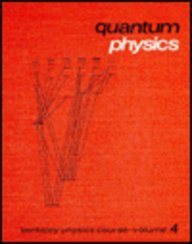Quantum Physics (Berkeley Physics Course, Volume 4) download
Par anderson johnny le dimanche, juin 25 2017, 04:21 - Lien permanent
Quantum Physics (Berkeley Physics Course, Volume 4). Eyvind H. Wichmann

Quantum.Physics.Berkeley.Physics.Course.Volume.4..pdf
ISBN: 0070048614,9780070048614 | 423 pages | 11 Mb

Quantum Physics (Berkeley Physics Course, Volume 4) Eyvind H. Wichmann
Publisher: Mcgraw-Hill College
If you are going to reject scientific theories because they fail to match up to your "common sense" it seems to me the place to start is here: Peter Woit: *Quantum Mechanics for Mathematicians* >**1.2 Basic axioms of quantum mechanics**… > **Axiom In the Copenhagan interpretation, this principle captures the physics of the collapse of the wave packet under measurement, which is not a process we understand. While there, he was a member of the Berkeley Fundamental Fysiks Group, founded in May 1975 by Elizabeth Rauscher and George Weissmann, which met weekly to discuss philosophy and quantum physics. Fast forward to the mid-1960s: I was a graduate student at the University of California, Berkeley, which was the center of S-matrix theory, the string theory of the day. Quantum physicists appear to be as confused about quantum mechanics as the average man in the street – only at a deeper level! A generation of physicists from around the world were to pass through it and eventually it was to bestow on the orthodox account of quantum theory the apt description of the 'Copenhagen interpretation'. During this period he composed an article called "Mind, Matter and Quantum Mechanics," which he did not submit for publication, but which became the title of his 1993 book. Berkeley Physics Course vol 2 – Electricity and magnetism. Previous postCommunities Happenings – a weekly round-up of NPG online news 22/4/13 Which French chemist, discoverer of boron and iodine, is perhaps best known for his eponymous law, which states that if the mass and pressure of a gas are held constant then gas volume increases linearly as the Which German physicist is famed for his uncertainty principle, and was awarded the 1932 Nobel Prize in Physics “for the creation of quantum mechanics”? And the big one: why do the two pillars of 20th century physics, quantum mechanics and Albert Einstein's general theory of relativity, not agree with each other? This also explains why (as I realized when taking my first quantum physics course at Berkeley) none of the professors and grad students understood the thing they were supposed to be teaching us for that course. Or consider Euclid, book I, proposition 36. 3 Philosophy; 4 Second World War .. Berkeley Physics Course vol 1 – [2nd Ed] – Mechanics Berkeley Physics Course vol 2 – Electricity and magnetism. At the university's Rad Lab, experimentalists were constantly Part of the problem was that while quantum field theory had spectacularly reconciled special relativity and quantum mechanics, it was failing to do the heavy lifting in particle physics.